WebUploader大文件上传解决方案
本人在2010年时使用swfupload为核心进行文件的批量上传的解决方案。见文章:WEB版一次选择多个文件进行批量上传(swfupload)的解决方案。
本人在2013年时使用plupload为核心进行文件的批量上传的解决方案。见文章:WEB版一次选择多个文件进行批量上传(Plupload)的解决方案
最近在学习百度的开源上传组件WebUploader,写了一些示例以记录。WebUploader的缺点是没有一个比较好的现成的界面,这个界面需要自己去实现。自由度高了一些。
WebUploader是由Baidu WebFE(FEX)团队开发的一个简单的以HTML5为主,FLASH为辅的现代文件上传组件。在现代的浏览器里面能充分发挥HTML5的优势,同时又不摒弃主流IE浏览器,沿用原来的FLASH运行时,兼容IE6+,iOS 6+, android 4+。两套运行时,同样的调用方式,可供用户任意选用。浏览器支持ie6,ie7,ie8,ie9,ie10,ie11,firefox,chrome,edge。支持全平台操作系统:Windows,Mac,Linux支持文件夹上传下载,文件批量上传下载,层级目录保存。
关于WebUploader的功能说明:
大文件上传续传
支持超大文件上传(100G+)和续传,可以关闭浏览器,重启系统后仍然继续上传。
开源
提供ASP.NET,JSP,PHP示例和源代码,其中JSP提供MySQL,Oracle,SQL Server数据库的配置和示例代码。
分片、并发
分片与并发结合,将一个大文件分割成多块,并发上传,极大地提高大文件的上传速度。
当网络问题导致传输错误时,只需要重传出错分片,而不是整个文件。另外分片传输能够更加实时的跟踪上传进度。
预览、压缩
支持常用图片格式jpg,jpeg,gif,bmp,png预览与压缩,节省网络数据传输。
解析jpeg中的meta信息,对于各种orientation做了正确的处理,同时压缩后上传保留图片的所有原始meta数据。
多途径添加文件
支持文件多选,类型过滤,拖拽(文件&文件夹),图片粘贴功能。上传本地指定路径的文件,不需要通过点击按钮选择文件。
粘贴功能主要体现在当有图片数据在剪切板中时(截屏工具如QQ(Ctrl + ALT + A), 网页中右击图片点击复制),Ctrl + V便可添加此图片文件。
HTML5 & FLASH
兼容主流浏览器和低版本浏览器,接口一致,实现了两套运行时支持,用户无需关心内部用了什么内核。而且支持IE6,IE8浏览器。
同时Flash部分没有做任何UI相关的工作,方便不关心flash的用户扩展和自定义业务需求。
基于内存映射模式进行IO操作,充分发挥操作系统性能。
MD5秒传
当文件体积大、量比较多时,支持上传前做文件md5值验证,一致则可直接跳过。
如果服务端与前端统一修改算法,取段md5,可大大提升验证性能,耗时在20ms左右。
易扩展、可拆分
采用可拆分机制, 将各个功能独立成了小组件,可自由搭配。
采用AMD规范组织代码,清晰明了,方便高级玩家扩展。
文件夹上传
支持10万+级别的文件夹上传,续传。
支持层级目录结构保存,上传后能够将数据库层级信息保存在数据库中。
提供MySQL,Oracle,SQL Server数据库支持。
支持文件夹续传,在浏览器刷新,重启后仍然能够继续上传。
支持跨域上传。
PC端全平台支持
支持Windows,macOS,Linux。支持国产化操作系统,支持政务信息安全项目。
其中Windows支持低版本系统:Windows XP。
其中浏览器包括:IE6,IE7,IE8(x86,x64),IE9(x86,x64),IE10(x86,x64),IE11(x86,x64),360安全浏览器,360极速浏览器,QQ浏览器,搜狗浏览器,Maxthon(遨游)浏览器1.X,Maxthon(傲游)浏览器2.x,Firefox,Chrome,Opera 23+
一: 下面就是利用WebUploader组件,让客户一次选择多个文件,然后将选择的文件上传到服务器的批量文件解决方案。
让我们先来看看客户端的界面效果图。(多选文件,批量上传,上传进度显示)
1) 显示界面:

2) 进行多文件选择:
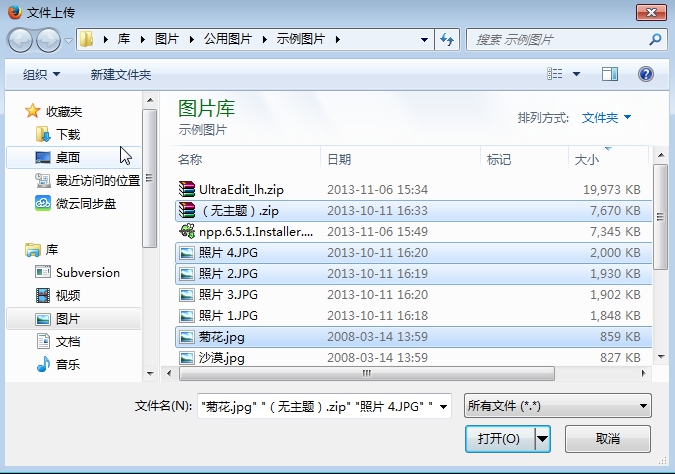
3) 上传进度显示
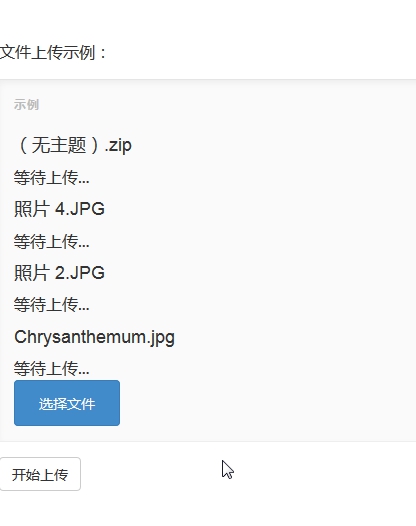
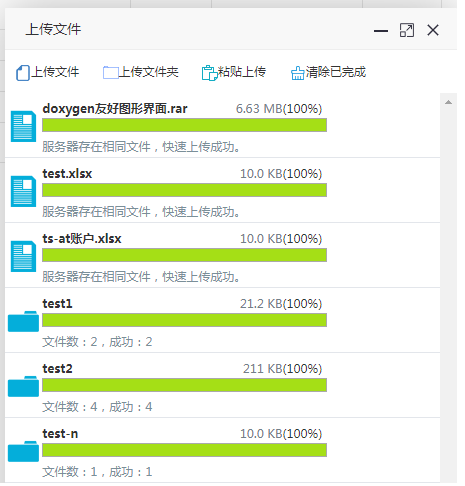
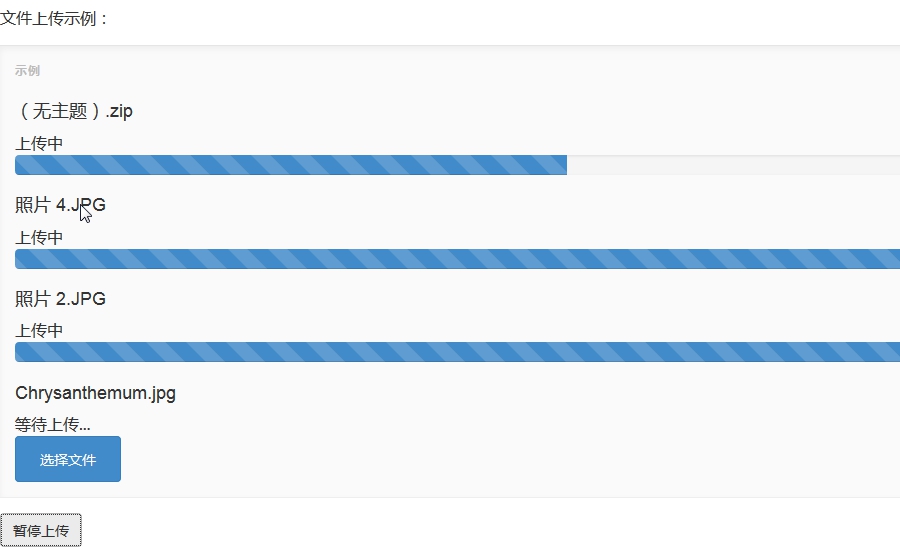
说明:见上图WebUploader默认是3个线程一起并发上传文件。如果需要增加并发数,或是减少并发数。可以修改threads属性,这个属性就是允许的最大上传并发数。
3) 上传成功显示
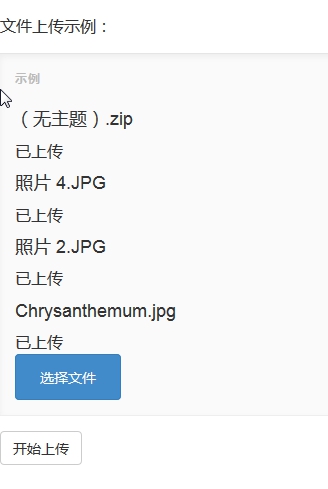
二:具体的代码与操作步骤:
第一步,要完成下面的示例,必须先准备好WebUploader组件。
1) WebUploader:大家可以访问WebUploader官方网站:http://www.webuploader.net,在这个网站上可以下载到组件与demo。
第二步,这个示例的目录结构如图:
1.主要目录结构
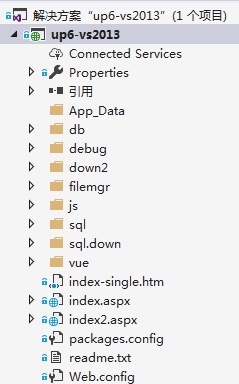
2. 此示例中用到的js脚本文件与css文件。

第三步,前台部分准备客户操作的WEB界面,如下[WebUploaderFileByBaidu2.aspx、UploaderFileByBaidu.ashx]
1) 前台客户端代码,其中WebUploaderFileByBaidu2.aspx的代码如下,WebUploaderFileByBaidu2.aspx.cs文件中只使用默认的代码,不用添加任何代码。
Html代码
<%@ Page Language=“C#” AutoEventWireup=“true” CodeBehind=“WebUploaderFileByBaidu2.aspx.cs” Inherits=“WebApplication1.WebUploaderFileByBaidu2” %><!DOCTYPE html><html xmlns=”http://www.w3.org/1999/xhtml”><head runat=”server”><meta http-equiv=”Content-Type” content=”text/html; charset=utf-8″/>
<title>WebUploader文件上传示例</title>
<script type=”text/javascript” src=”http://ajax.aspnetcdn.com/ajax/jQuery/jquery-1.8.2.min.js”></script>
<link href=”Scripts/webuploader/webuploader.css” rel=”stylesheet” />
<script type=”text/javascript” src=”Scripts/webuploader/webuploader.min.js”></script>
<link href=”https://cdn.bootcss.com/bootstrap/3.0.3/css/bootstrap.min.css” rel=”stylesheet”/>
<link href=”Scripts/style.css” rel=”stylesheet” />
<link href=”Scripts/demo.css” rel=”stylesheet” />
<link href=”Scripts/font-awesome.css” rel=”stylesheet” />
<script type=”text/javascript”>
var applicationPath = window.applicationPath === “” ? “” : window.applicationPath || “../../”;
// 文件上传 jQuery(function () {
var $ = jQuery,
$list = $(‘#fileList’),
$btn = $(‘#ctlBtn’),
state = ‘pending’,
uploader;
uploader = WebUploader.create({
// 不压缩image
resize: false,
// swf文件路径
swf: applicationPath + ‘Script/webuploader/Uploader.swf’,
// 文件接收服务端。
server: ‘UploaderFileByBaidu.ashx’,
// 选择文件的按钮。可选。
// 内部根据当前运行是创建,可能是input元素,也可能是flash.
pick: ‘#picker’
});
// 当有文件添加进来的时候
uploader.on(‘fileQueued’, function (file) {
$list.append(‘<div id=”‘ + file.id + ‘” class=”item”>’ +
‘<h4 class=”info”>’ + file.name + ‘</h4>’ +
‘<p class=”state”>等待上传…</p>’ +
‘</div>’);
});
// 文件上传过程中创建进度条实时显示。
uploader.on(‘uploadProgress’, function (file, percentage) {
var $li = $(‘#’ + file.id),
$percent = $li.find(‘.progress .progress-bar’);
// 避免重复创建
if (!$percent.length) {
$percent = $(‘<div class=”progress progress-striped active”>’ +
‘<div class=”progress-bar” role=”progressbar” style=”width: 0%”>’ +
‘</div>’ +
‘</div>’).appendTo($li).find(‘.progress-bar’);
}
$li.find(‘p.state’).text(‘上传中’);
$percent.css(‘width’, percentage * 100 + ‘%’);
});
uploader.on(‘uploadSuccess’, function (file) {
$(‘#’ + file.id).find(‘p.state’).text(‘已上传’);
});
uploader.on(‘uploadError’, function (file) {
$(‘#’ + file.id).find(‘p.state’).text(‘上传出错’);
});
uploader.on(‘uploadComplete’, function (file) {
$(‘#’ + file.id).find(‘.progress’).fadeOut();
});
uploader.on(‘all’, function (type) {
if (type === ‘startUpload’) {
state = ‘uploading’;
} else if (type === ‘stopUpload’) {
state = ‘paused’;
} else if (type === ‘uploadFinished’) {
state = ‘done’;
}
if (state === ‘uploading’) {
$btn.text(‘暂停上传’);
} else {
$btn.text(‘开始上传’);
}
});
$btn.on(‘click’, function () {
if (state === ‘uploading’) {
uploader.stop();
} else {
uploader.upload();
}
});
});
</script></head>
<body>
<div class=”container-fluid”>
<div class=”col-md-10″>
<div class=”row”>文件上传示例:</div>
<div class=”row”>
<div id=”uploader” class=”wu-example”>
<!–用来存放文件信息–>
<div id=”fileList” class=”uploader-list”></div>
<div class=”btns”>
<div id=”picker” class=”btn btn-primary”>选择文件</div>
</div>
</div>
</div>
<div class=”row”>
</div>
<div class=”row”> <button id=”ctlBtn” class=”btn btn-default”>开始上传</button></div>
</div>
<div>
</div>
</div>
</body></html>
以上代码最后的显示结果如下图:

2) 接收前端用户上传的文件,并把文件保存到指定目录中。UploaderFileByBaidu.ashx文件中使用默认的代码,不需要添加任何代码。UploaderFileByBaidu.ashx.cs文件的代码如下:
using System;using System.Collections.Generic;using System.IO;using System.Linq;using System.Text;using System.Web;namespace WebApplication1
{
/// <summary>
/// UploaderFileByBaidu 的摘要说明
/// </summary>
public class UploaderFileByBaidu : IHttpHandler
{
public void ProcessRequest(HttpContext context)
{
context.Response.ContentEncoding = Encoding.UTF8;
if (context.Request[“REQUEST_METHOD”] == “OPTIONS”)
{
context.Response.End();
}
SaveFile();
}
/// <summary>
/// 文件保存操作
/// </summary>
/// <param name=”basePath”></param>
private void SaveFile(string basePath = “~/Upload/Images/”)
{
basePath = FileHelper.GetUploadPath();
string Datedir = DateTime.Now.ToString(“yy-MM-dd”);
string updir = basePath + “\\” + Datedir;
string extname = string.Empty;
string fullname = string.Empty;
string filename = string.Empty;
HttpFileCollection files = System.Web.HttpContext.Current.Request.Files;
if (files.Count == 0)
{
var result = “{\”jsonrpc\” : \”2.0\”, \”error\” : \”保存失败\”,\”id\” : \”id\”}”;
System.Web.HttpContext.Current.Response.Write(result);
}
if (!Directory.Exists(updir))
Directory.CreateDirectory(updir);
var suffix = files[0].ContentType.Split(‘/’);
var _suffix = suffix[1].Equals(“jpeg”, StringComparison.CurrentCultureIgnoreCase) ? “” : suffix[1];
var _temp = System.Web.HttpContext.Current.Request[“name”];
if (!string.IsNullOrEmpty(_temp))
{
filename = _temp;
}
else
{
Random rand = new Random(24 * (int)DateTime.Now.Ticks);
filename = rand.Next() + “.” + _suffix;
}
fullname = string.Format(“{0}\\{1}”,updir , filename);
files[0].SaveAs(fullname);
var _result = “{\”jsonrpc\” : \”2.0\”, \”result\” : null, \”id\” : \”” + filename + “\”}”;
System.Web.HttpContext.Current.Response.Write(_result);
}
public bool IsReusable
{
get
{
return false;
}
}
}
}
第四步:文件辅助类
/// <summary>///FileHelper 的摘要说明/// </summary>public class FileHelper
{
public FileHelper()
{
//
//TODO: 在此处添加构造函数逻辑
// }
/// <summary>
/// 获取上传目录
/// </summary>
/// <returns></returns>
public static string GetUploadPath()
{
string path = HttpContext.Current.Server.MapPath(“~/”);
string dirname = GetDirName();
string uploadDir = path + “\\” + dirname;
CreateDir(uploadDir);
return uploadDir;
}
/// <summary>
/// 获取临时目录
/// </summary>
/// <returns></returns>
public static string GetTempPath()
{
string path = HttpContext.Current.Server.MapPath(“~/”);
string dirname = GetTempDirName();
string uploadDir = path + “\\” + dirname;
CreateDir(uploadDir);
return uploadDir;
}
private static string GetDirName()
{
return System.Configuration.ConfigurationManager.AppSettings[“uploaddir”];
}
private static string GetTempDirName()
{
return System.Configuration.ConfigurationManager.AppSettings[“tempdir”];
}
public static void CreateDir(string path)
{
if (!System.IO.Directory.Exists(path))
{
System.IO.Directory.CreateDirectory(path);
}
}
}
第五步,Web.config文件配置信息。
<?xml version=”1.0″ encoding=”utf-8″?><configuration>
<configSections>
<!– For more information on Entity Framework configuration, visit http://go.microsoft.com/fwlink/?LinkID=237468 –>
</configSections>
<appSettings>
<add key=”uploaddir” value=”upload” />
<add key=”tempdir” value=”temp” />
</appSettings>
<system.web>
<compilation debug=”true” targetFramework=”4.0″ />
<authentication mode=”Windows” />
<httpRuntime maxRequestLength=”2147483647″ appRequestQueueLimit=”1200″ executionTimeout=”1200″/>
<pages controlRenderingCompatibilityVersion=”3.5″ clientIDMode=”AutoID” />
</system.web>
<system.webServer>
<security>
<requestFiltering >
<requestLimits maxAllowedContentLength=”2147483647″ ></requestLimits>
</requestFiltering>
</security>
</system.webServer></configuration>
第六步,在进行上传之后,文件保存在对应的日期目录下。如下图。
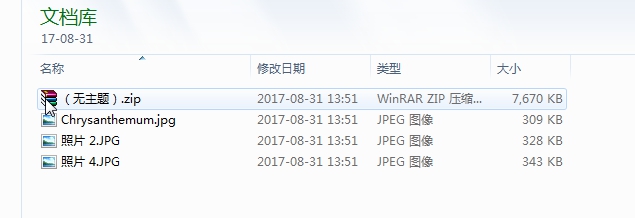
后端代码逻辑大部分是相同的,目前能够支持MySQL,Oracle,SQL。在使用前需要配置一下数据库,可以参考我写的这篇文章:http://blog.ncmem.com/wordpress/2019/08/09/web%E5%A4%A7%E6%96%87%E4%BB%B6%E4%B8%8A%E4%BC%A0%E8%A7%A3%E5%86%B3%E6%96%B9%E6%A1%88/
欢迎入群一起讨论“374992201”